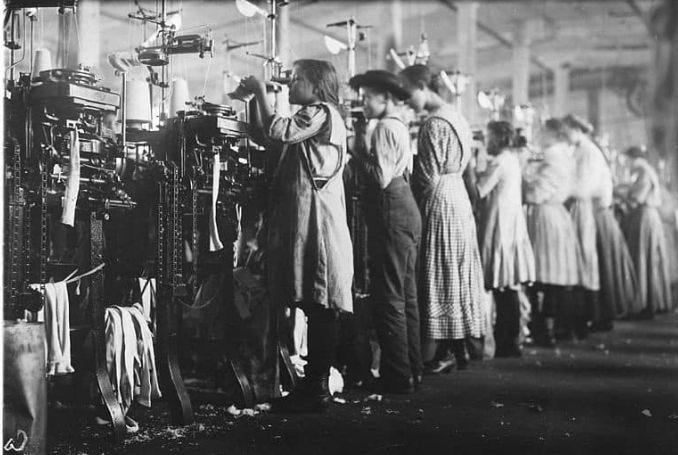Let me acquaint you with a word that you might not have encountered before.
Immiseration (variant of immiserization, n.): The act of making or becoming progressively more miserable; pauperization, impoverishment.
With Trump back in office, this is a word that you not only need to know, but know more about. So we’ll start with a bit of etymology. The study of the origin and evolution of words always enhances our understanding and appreciation of them.
Some Edifying Etymology
In Old English, the prefix im- (taken from the Latin) was a variant of the prefix in-. In some usages, im- signified the situation of something that is or appears to be enclosed by something else; within the limits or bounds of, within (any place or thing). For example: impeach.
Impeach means to bring a charge or accusation against; to cast an imputation upon. Coming through Old French, our English word derives from the Latin impedicāre, meaning to catch, entangle. As you can see, the Latin word itself is formed by a combination of the prefix im- + pedica, meaning to fetter. So, by its origins, the word impeach signifies, at least in part, to put one into shackles or handcuffs. (Oh, if only Trump’s second impeachment trial had ended so...)
Consider as well the English word immerse: to dip or plunge into a liquid; to put overhead in water. This word also comes from Latin, formed from the stem immer- of the full Latin word immergĕre, meaning to dip, plunge. English also has the derivative verb to immerge that means the same thing.
In short, then, the idea of im-ing something or someone is to submerge them into a liquid (or a liquidy substance) or to surround them in some particular state of being. Often, im-ing involves putting someone in difficulty, into some kind of a tight spot.
No doubt by now you’re getting the picture that immiseration means, fundamentally, to plunge someone into misery. That is: im- + miserable.
For most words, this spot of etymology would be enriching enough. In the case of immiseration, however, there’s a bit more worth knowing.
Unlike so many English words, immiseration does not come from borrowing words from other languages. Instead, immiseration comes from translating the German word verelendung.
Normally, verelendung is translated into English to mean impoverishment (with an alternative being pauperization). That’s what Google Translate tells us, for example. Google Translate also tells us that the German verb verelen means to impoverish, and the adjective verelend means impoverished. All the German speaker has to do, then, is add the common German suffix -ung (a suffix similar to the English suffixes -ing, -tion, or -ation) to arrive at the German noun verelendung—impoverishment.
This all seems straightforward enough.
Yet why, then, does English also have the word immiseration? Where did that translation come from? Why did some translator somewhere, when interpreting the German word verelendung, decide not to use the standard and readily available English word impoverishment but, instead, coin (that is, make up) a brand new English word—immiseration—to interpret the meaning of the German word verelendung?
Great questions. And here we come to the all-important thing about words and their meanings: context.
According to the Oxford English Dictionary, immiseration as a translation of verelendung first appeared in 1942. Later, in 1956, the verb to immiserate likewise was added to our language as a back-formation of immiseration. Both coinages appeared—and thereby entered the English language—in academic studies dealing with modern economic and political issues. More exactly, these scholarly publications focused on economic and political issues involving the theories of Karl Marx. (Oh shit, you say. Not THAT guy again.)
One of the issues foremost on Marx’s mind was the verelendung of European industrial workers as they were being subjected to the brutalities of early capitalism. Marx was all about calling out the verelendung of the 19th-century proletariat. So much so that he seemed to think that the verelendung would get so bad that someday wage-workers around the world could be persuaded both to recognize and overthrow the economic and social oppression created by capitalism as a system and an ideology.
In short, verelendung is one of the keystone principles of Marx’s economic worldview.
Obviously, I can’t say with certainty why these mid-20th-century translators of Marx decided to make up new English words to signal the meanings of verelendung and verelen. Based on this context, though, I can hazard the educated guess that these translators determined that the English word impoverishment (or pauperization) just didn’t do full justice to Marx’s use of the word verelendung.
Maybe these translators thought that a better English word was needed—at least in the field of modern Economics—to convey the depth of Marx’s thinking and feeling on the subject of the exploitation of the working class. Maybe these translators were looking for an English word that was richer in meaning, more vivid, even fiercer when discussing this crucial concept of verelendung.
Also, maybe these translators wanted an English word that was more accurate to the original.
I think it safe to speculate as well, based on context, that these translators were not only thoroughly familiar with Marx’s ideas, but that they knew the German language extremely well. I’d wager that they were quite aware of the fact that the German word for misery is Elend. And that the German prefix ver- means to do, to become, to move or change in the manner specified by the stem word (in this case, Elend). As pointed out above, just add the German suffix -ung to this combination and you arrive at the rather amazing word:
ver- (to move or change in the manner of the stem word) + elend (misery) + -ung (the result or process of the stem word).
I can easily see why these expert translators decided that a far more exact and meaningful way to translate this rich, vivid, even fierce German word into English would be as:
im- (to enclose or immerse) + miser (misery) + -ation (an action, process, state, condition, or result).
That is: to plunge into misery.
I also think it safe to say that immiseration does a better job, as a signifier, of driving home the signified horror of being forced into poverty. Impoverishment has a touch of passivity to it. A ring of something that just kind of happens to people somehow. As if bad luck makes one a pauper. Immiseration, on the other hand, (as well as immiserization and to immiserate) has a much more active and dynamic gist to it.
That is to say, to be plunged into misery doesn’t just happen. Somebody has to be doing the plunging.
Make sense? All good? Are you sufficiently etymologized?
Okay, now before explaining why I think you need to keep this remarkable word in mind over the next four years, we need just a bit more context. Namely, to consider a few of Marx’s ideas about people being plunged into misery.
Marx on Immiseration
As noted above, immiseration is a key concept for Marx. Early in his career as a political activist, journalist, and social-economic theorist, Marx seemed to think that a worker revolution, spurred on by the immiseration of the industrial laborer, was just around the corner, especially in industrially advanced countries such as England and France. This revolution, moreover, would serve to replace capitalism with communism. (If you want to spruce up on some of Marx’s basic economic concepts—and who doesn’t?!—see Let Marx Liven Up Your Thanksgiving Dinner! and Marx’s Ideas about Ownership and Alienation.)
As for why Marx believed the proletariat would be willing and able to carry out such a revolution—and no less a revolution that would be worldwide—four main ingredients characterize his thinking (for much of what follows, see Marx).
1) Wage-working people will become so immiserated within a system of material productivity that shows this immiseration to be entirely and obviously unnecessary, that they will be motivated to revolt.
2) Wage-working people will be able to identify, quite correctly, the capitalist class as the cause of this unnecessary immiseration.
3) Wage-working people, because they have been organized into large workforces by capitalism, will have the required capacity to work together in close contact on such a highly collaborative undertaking as revolution.
4) Eventually, so many wage-working people will be immiserated by the capitalist class that they will consist of the large majority of the population, thereby having the numbers to carry out such a vast collaborative action as revolution.
As Marx grew older, however, and saw that such an uprising obviously was not on the horizon, he recognized a number of factors that were delaying—and might in the end outright thwart—a worker revolution. The reasons he cites are:
1) Capitalism drives the process of globalization, which greatly extends the life cycle of capitalism; that is, until capitalism has completed its in-built cycle on a worldwide scale (scouring the globe to locate and exploit desperate workers), a mass movement against capitalism by internationally immiserated workers will not be possible.
2) Capitalists are adept at granting marginal improvements to the lives of workers (e.g. minimal salary increases, somewhat improved working conditions, seeming benefits such as inadequate healthcare); these largely empty concessions appear to ease immiseration and thus dampen worker motivation to revolt.
3) Wage-workers often get distracted by various social antagonisms directed at other wage-workers (e.g. racial conflicts, religious conflicts, gender conflicts, immigration conflicts); these hostilities divert working people from the actual source of their felt misery—namely, immiseration at the hands of the capitalists; moreover, capitalists are adept at fanning the flames of such worker-vs.-worker conflicts.
For nearly a century and a half, both advocates and detractors of Marx’s theories have argued over when or if such a worker uprising might happen. (By the way, since 1942, most of these economic and political experts have used the word immiseration.) While there are no clear answers to this dispute, one thing is abundantly clear.
Marx’s predictions about immiseration have more than come to pass.
Without a doubt, capitalists plunging millions of working people into misery exists and is getting worse. Widespread global immiseration—impoverishment, pauperization—has been running rampant since the 1980s. This blight is hitting Americans hard, as well.
The numbers are grim. (If you want to review the statistics showing the staggering degree of wealth inequality around the world and in America, see Into the Neoliberal Weeds.)
Nor do our current conditions of employment promise improvement. (If you want to review the process by which, under current neoliberal capitalism, wage-workers are reduced to wage-slaves and debt-slaves, see The Neoliberal Workplace and Neoliberal Financial Markets.)
This ugly state of affairs begs us to ask the obvious question: So where the hell is Marx’s worker revolt?
What level of immiseration will it take to trigger wage-workers, finally, into deciding enough is enough? Or, on the other hand, what measures will it take by capitalists to stymie, mitigate, distract, and suppress wage-workers from ever recognizing—much less doing anything about—their immiseration?
Even though there are no clear answers to these questions, I think now, more than ever, we should be clear-eyed about what factors and forces obviously figure into this, well, let’s call it The Immiseration Question. That is to say, with so much palpable economic misery afoot, what stands in the way of meaningful improvement? I’m not talking about some vague form of communism being launched. I’m asking what prevents any kind of real economic sea change for the better from being instituted?
I’ll put the question more bluntly.
How in the holy hell did a two-faced, thug-forward, arch-immiserator buffoon like Trump get re-elected?
(Hey! I just coined a new word! Immiserator Copyright © 2025 Kirk Combe.)
End of Part 1
COMING IN TWO WEEKS: Part 2—Why You Need to Know the Word Immiseration
AND DON’T FORGET...
Read some provocative fiction. Check out and subscribe to my other Substack newsletter, 2084 Quartet at:
While you’re at it, read some provocative social commentary. Check out and subscribe to this absolute Substack gem as well:









Really appreciate the breaking down of one little word! And the photos in here are A+
Really sobering, especially in light of the recent offer by Fire 'n Fury to federal civil "servants" to take a delayed resignation.
Egad.